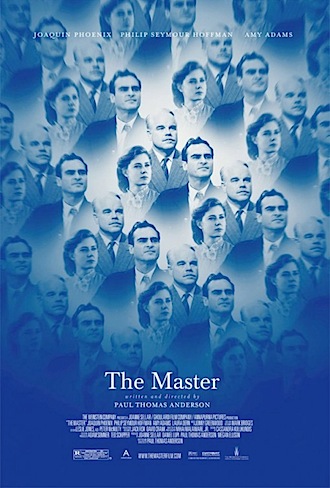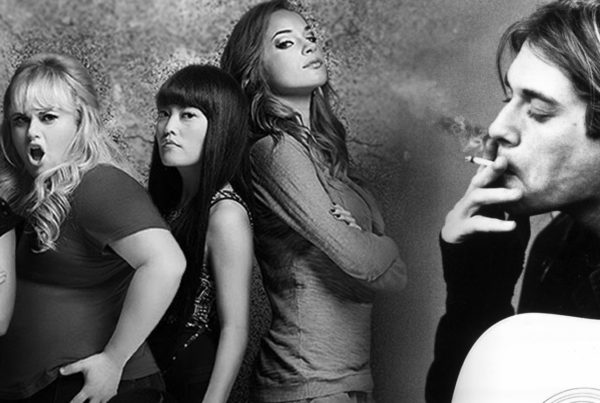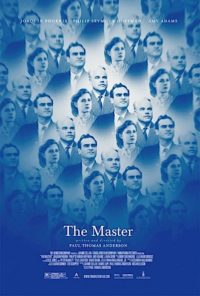 Between its heralded US release in September last year and its arrival in a (very) limited number of New Zealand cinemas this weekend, Paul Thomas Anderson’s The Master seems to have been transformed from masterpiece and annointed Best Picture contender to also-ran, disappointing scores of local PTA fans in the process, many of whom were crushed that we weren’t going to see the film in the director’s preferred 70mm format. Turns out it was touch and go whether we were going to see it on the big screen at all.
Between its heralded US release in September last year and its arrival in a (very) limited number of New Zealand cinemas this weekend, Paul Thomas Anderson’s The Master seems to have been transformed from masterpiece and annointed Best Picture contender to also-ran, disappointing scores of local PTA fans in the process, many of whom were crushed that we weren’t going to see the film in the director’s preferred 70mm format. Turns out it was touch and go whether we were going to see it on the big screen at all.
Anderson’s previous film, There Will Be Blood, was a close-run second to No Country For Old Men in my 2007 pick of the year, and his back catalogue is as rich as anyone else of his generation – Boogie Nights, Magnolia and even Adam Sandler in Punch-Drunk Love. Like Blood, The Master is painted on a big canvas. Joaquin Phoenix plays Freddie Quell, an alcoholic and self-hating WWII veteran, stumbling between misadventures when he stows away on the San Francisco yacht commanded by academic, author and mystic Lancaster Dodd (Philip Seymour Hoffman). Dodd combines rudimentary psychotherapy with hypnosis to persuade gullible followers that their past lives can be used to transform their disappointing present.
Angry, horny and frustrated – a walking id – Freddie represents the ultimate challenge to Dodd’s method and his ego. Can he save this man or will his meddling push him into the abyss?
Anderson’s craft is impeccable as always. The Master is classical cinema fit to rank – on some levels – with Kubrick or with Malick. The cinematography (Mihai Malaimare Jr.), production design (David Crank and Jack Fisk) and performances by all concerned (including Amy Adams as the Lady Macbeth behind the guru). Top marks go to Radiohead’s Jonny Greenwood for a classical score that transforms and elevates every scene.
All of the above is true and yet, I can’t quite bring myself to love The Master the way I wanted to. Perhaps it’s because my favourite Anderson films (Boogie Nights and There Will Be Blood) transcend the psychological and the character study to say something about the capitalist system and the world in which we all toil – Blood wasn’t just about an obsessed prospector it was also about the birth of an industry that still shackles us. I’m not sure, yet, what The Master is about and whether it has those extra layers that put it in the pantheon where it looks like it belongs. Or maybe I’m expecting too much?
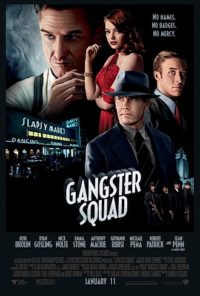 Ruben Fleischer’s Gangster Squad is horrible – a bunch of soft actors playing pretendies. There’s not an authentic note in the entire misbegotten mess. Like The Master, this is a film about WWII veterans looking for a peacetime role in a world that can’t or won’t acknowledge their sacrifice, but it botches whatever depth it might have had by mis-writing, mis-casting and mis-directing. Ryan Gosling is in full-on smug mode as the supposedly alcoholic veteran and LA cop who finds new purpose in life when he falls for Emma Stone, the girlfriend of gangster Mickey Cohen (Sean Penn playing Al Pacino at his worst). I’m usually a big fan of Gosling but he couldn’t be more wrong here.
Ruben Fleischer’s Gangster Squad is horrible – a bunch of soft actors playing pretendies. There’s not an authentic note in the entire misbegotten mess. Like The Master, this is a film about WWII veterans looking for a peacetime role in a world that can’t or won’t acknowledge their sacrifice, but it botches whatever depth it might have had by mis-writing, mis-casting and mis-directing. Ryan Gosling is in full-on smug mode as the supposedly alcoholic veteran and LA cop who finds new purpose in life when he falls for Emma Stone, the girlfriend of gangster Mickey Cohen (Sean Penn playing Al Pacino at his worst). I’m usually a big fan of Gosling but he couldn’t be more wrong here.
Stone is no Veronica Lake – she’s not even Jessica Rabbit – and the entirety of Gangster Squad is an insult to decades of great LA crime stories. It even has a shootout in Chinatown for pete’s sake.
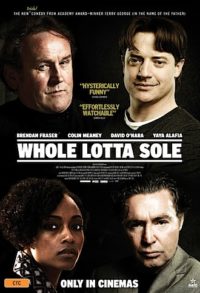 But, as crime flicks go, Whole Lotta Sole (aka Stand Off) makes Gangster Squad look like Chinatown. Brendan Fraser plays an American starting a new life in Belfast who gets caught up in some low level chicanery and finds himself holed up in his antique shop with a baby, two gypsy children, an Ethiopian refugee and a frightened young man with a machine gun, while the police (Colm Meaney), the SAS and the Belfast are outside waiting for him.
But, as crime flicks go, Whole Lotta Sole (aka Stand Off) makes Gangster Squad look like Chinatown. Brendan Fraser plays an American starting a new life in Belfast who gets caught up in some low level chicanery and finds himself holed up in his antique shop with a baby, two gypsy children, an Ethiopian refugee and a frightened young man with a machine gun, while the police (Colm Meaney), the SAS and the Belfast are outside waiting for him.
Supposedly a comedy, but in fact almost exactly the opposite, Whole Lotta Sole is written and directed by Terry George who made Hotel Rwanda – and whose last short film won an Oscar – so I have no idea how this could be so bad.
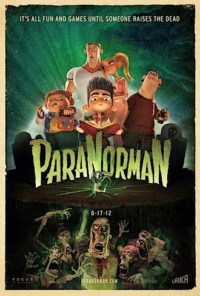 Before the holidays finish, take your kids to see ParaNorman. None of you will be disappointed. It’s a 3D stop-motion animated film that gives youngsters a horror film of their own – and in a way that isn’t patronising or indulgent like Burton’s Frankenweenie or lame like Hotel Transylvania. In fact, it’s actually pretty spooky and pretty gory. Norman (voiced by Kodi Smit-McPhee who has done real horror in The Road and Let Me In) can see dead people. In fact, he’s the only person in his little town who can see and talk to ghosts. Which is a good thing for him as he doesn’t have any other real friends. When the town curse looks like rising up to destroy everyone, Norman’s unique skill-set is the only way to save them all.
Before the holidays finish, take your kids to see ParaNorman. None of you will be disappointed. It’s a 3D stop-motion animated film that gives youngsters a horror film of their own – and in a way that isn’t patronising or indulgent like Burton’s Frankenweenie or lame like Hotel Transylvania. In fact, it’s actually pretty spooky and pretty gory. Norman (voiced by Kodi Smit-McPhee who has done real horror in The Road and Let Me In) can see dead people. In fact, he’s the only person in his little town who can see and talk to ghosts. Which is a good thing for him as he doesn’t have any other real friends. When the town curse looks like rising up to destroy everyone, Norman’s unique skill-set is the only way to save them all.
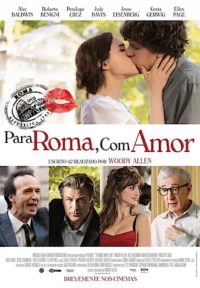 Woody Allen’s To Rome With Love continues the ageing director’s farewell tour of Europe and is – to my mind – a much more satisfying – although slender – entertainment than his last hit, Midnight in Paris. Where that film was no more than a sketch stretched out to feature length, this one is a series of sketches given just enough screen time before they can outstay their welcome. I don’t know if they say anything about Rome specifically, but there is some amusement to be had at the expense of Roberto Benigni, Alec Baldwin and Allen himself. A 1950s attitude to women is the only disadvantage – along with some miscasting which is rare for Allen.
Woody Allen’s To Rome With Love continues the ageing director’s farewell tour of Europe and is – to my mind – a much more satisfying – although slender – entertainment than his last hit, Midnight in Paris. Where that film was no more than a sketch stretched out to feature length, this one is a series of sketches given just enough screen time before they can outstay their welcome. I don’t know if they say anything about Rome specifically, but there is some amusement to be had at the expense of Roberto Benigni, Alec Baldwin and Allen himself. A 1950s attitude to women is the only disadvantage – along with some miscasting which is rare for Allen.
Printed in Wellington’s Capital Times on Wednesday 23 January, 2013.

